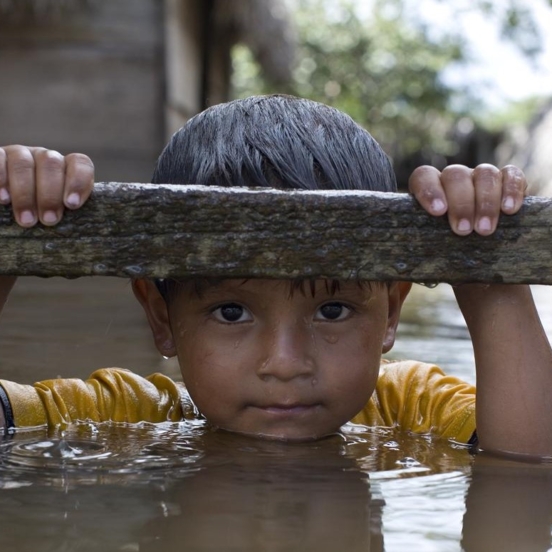Climate, Health and Equity Brief
Children at risk, “code red for humanity,” and climate action in DC
August 30, 2021

The Climate, Health & Equity Brief is GMMB’s take on the week’s news on the current impacts of climate change. If you haven’t subscribed yet, you can do so by clicking here.
Hot Topic: For the children. As Congress moved forward sweeping legislation that would expand national climate programs this week, new research highlights the intense impacts of climate change on the world’s children.
The Children’s Climate Risk Index, which combines high-resolution maps of climate and environmental impacts with maps of child vulnerability, found that nearly every child around the world was at risk from at least one impact of the climate crisis and pollution. More dire still, nearly half of the world’s 2.2 million children face three to four impacts—including heatwaves, storms and drought—simultaneously.
Another study found that the impacts of wildfires begin before birth, leading to as many as 7,000 premature births in the state of California between 2007 and 2012. The study found that a month of exposure to wildfire smoke was associated with a 20 percent increase in preterm birth.
With science continuing to show just how dire the impact of the climate crisis is and the United Nations warning this week of “code red for humanity” due to rapid global warming, the House of Representatives this week passed a $3.5 billion-dollar budget plan that allocates significant funding for climate programs, including a new tax on imported fossil fuels, federal aid for clean energy developers and investments in low-polluting vehicles.
While the bill still needs to pass the Senate, it’s a heartening step forward—and analysis by Senate Majority Leader Schumer’s office shows that the climate measures contained in the bipartisan infrastructure bill and the reconciliation bill, combined, would put the U.S. on track to meet President Biden’s goal of reducing emissions by 50 percent below 2005 levels by 2030.
— Matt & Traci, GMMB
Human Health
A new report calculating the global Children’s Climate Risk Index revealed that every child in the world is facing one climate impact, and at least one billion children – nearly half of all children – face across 33 countries are at extremely high risk of facing three toor four climate-fueled impacts—including heatwaves, storms and drought—simultaneously. (The Guardian)
A new Environmental Research study found that up to 7,000 premature births in the state of California were caused by wildfire smoke between 2007 and 2012, and that a month’s worth of smoke exposure was associated with a 20 percent increased risk for preterm birth. (The Guardian)
Tropical Storms Grace and Henri made landfall over the weekend in Mexico and the U.S. Northeast respectively, with Grace triggering devastating mudslides that have killed eight people and Henri leaving more than 140,000 households without power following record-setting rainfall and powerful winds. (NBC News, The New York Times)
Flash flooding has killed at least 21 people and destroyed hundreds of homes in Tennessee—a state traditionally considered immune to flood risk—after an unprecedented 17 inches of rain fell in a single day on Saturday. (The Washington Post)
Planetary Health
The Greenwood Fire, currently burning nearly 26,000 acres in northeastern Minnesota, created its own weather system when dense smoke produced thunder-bearing pyrocumulous (fire) clouds over the region. (NBC News)
As another heatwave takes hold in California—where 1.6 million acres have already fallen victim to wildfires this season—officials warn that new fires sparked in Northern California are exhibiting extreme growth due to unprecedented fuel conditions, with some blazes traveling up to eight miles in a single day. (CNN)
A recent analysis from the World Bank warns that the Middle East—already warming at twice the global average—could face up to four months of extreme heat annually by 2100, threatening to make the region uninhabitable. (Foreign Policy)
A new report analyzing a July flood event in northeastern Germany revealed that climate change made the flooding up to nine times more likely, and has made rainstorms in the region up to 19 percent more intense so far this summer. (InsideClimate News)
We do not inherit the Earth from our ancestors, we borrow it from our children.”
-Native American proverb
Politics & Economy
The House of Representatives passed a $3.5 trillion budget plan that includes investments in climate programs, teeing up the reconciliation process that Democrats plan to use to pass their budget without Republican support. (The New York Times)
A new analysis found that over the last 30 years, the Taliban has capitalized on agricultural and economic instability driven by climate-fueled drought and flooding to sow government resentment among farmers and recruit supporters. (CBS News)
A new analysis set to be released by Senate Majority Leader Schumer’s Office found that climate efforts funded by the budget reconciliation and bipartisan infrastructure bills will combine to cut nationwide emissions in half compared to 2005 levels by 2030. (The Atlantic)
Action
In an effort to reduce overall emissions from the air travel industry, the Federal Aviation Administration has announced $20.4 million in grants for airports to electrify their equipment and transition to zero-emission vehicle fleets. (Axios)
New data from the American Clean Power Association reports that 5.62 gigawatts of clean energy—enough to power nearly 4.2 million homes—were installed in the second quarter of 2021, a record-breaking amount that has seen the U.S. double its clean energy supply in the past five years. (S&P Global)
Kicker
Need help talking to your kids about climate change? Check out this comprehensive guide for discussing the basic facts, answering tough questions and helping them cope with climate anxiety.
The GMMB Climate, Health & Equity Brief would not be possible without the contributions of the larger GMMB California team—Aaron Benavides, Elke Cortes, Stefana Simonetto and Sydney Lykins. Feedback on the Brief is welcome and encouraged and should be sent to CHandEBrief@gmmb.com.






